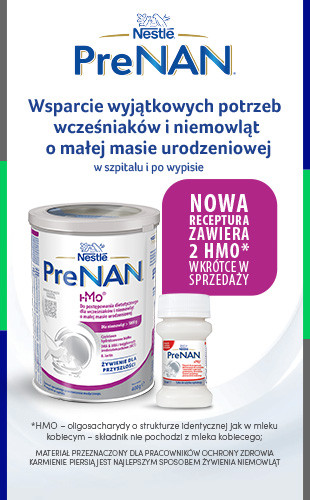Ocena wiedzy kobiet na temat potrzeby stosowania suplementów diety w okresie ciąży
Słowa kluczowe / Keywords:
Streszczenie:
Wprowadzenie: Ciąża jest dla kobiety najbardziej wymagającym pod względem żywienia okresem w życiu. Zwiększone zapotrzebowanie na witaminy
i składniki mineralne, przy tylko nieznacznie wyższym zapotrzebowaniu na energię, zmusza do starannego układania jadłospisu, a także do stosowania
suplementacji. Kobieta ciężarna powinna zadbać o optymalne zaopatrzenie swojego organizmu we wszystkie niezbędne witaminy i składniki
mineralne, gdyż nawet najmniejsze ich niedobory mogą niekorzystnie wpłynąć na rozwój dziecka.
Cel pracy: Celem pracy była ocena wiedzy kobiet ciężarnych na temat konieczności przyjmowania preparatów suplementacyjnych podczas ciąży,
a także poznanie częstości oraz motywów stosowania suplementów przez kobiety spodziewające się dziecka.
Materiały i metody: Badaniem objęto grupę 150 kobiet w ciąży w wieku 18-45 lat z terenu województwa podkarpackiego. Narzędziem badawczym
był autorski kwestionariusz ankietowy, w którym zawarto pytania dotyczące stosowania suplementów diety przez ciężarne.
Wyniki: Stwierdzono, że 74% badanych kobiet sięga po suplementy diety w trakcie trwania ciąży, przy czym trzy czwarte z nich stosuje suplementację
od pierwszych dni ciąży. Zdecydowanie mniej, bo 40%, przyjmuje preparaty tego typu również przed zajściem w ciążę. Podstawowym
motywem do zainteresowania się suplementami jest ich wartość prozdrowotna, zarówno dla dziecka, jak i samej ciężarnej, a głównym bodźcem
do regularnego ich stosowania jest konsultacja lekarska. Najczęściej kobiety sięgają po kwas foliowy (83,3%), z czego 28% jeszcze przez zajściem
w ciążę. Powszechne wśród respondentek jest stosowanie suplementów mineralno-witaminowych (60,4%), rzadziej preparatów zawierających DHA
(25,2%), żelazo (19,8%), witaminę D3 (9,9%), jod (8,1%), magnez z witaminą B6 (5,4%).
Wnioski: Świadomość potrzeby wspomagania organizmu kobiety ciężarnej poprzez przyjmowanie suplementów jest powszechna, ale posiadana
przez uczestniczki badania wiedza w tym zakresie nie jest wystarczająca. Istnieje konieczność uświadamiania, że tylko niektóre suplementy, takie jak
kwas foliowy czy DHA, mogą być stosowane rutynowo, natomiast decyzja o przyjmowaniu innych witamin czy minerałów, które mogą być ważne dla
prawidłowego przebiegu ciąży, powinna być skonsultowana ze specjalistą.
Abstract:
Introduction: Pregnancy is a special period in a woman’s life which needs the highest nutritional requirements. Increased demand for vitamins and
minerals with relatively little increased demand for energy is forcing to careful laying of diet and increasingly turning to the use of supplementation.
The pregnant woman needs to ensure optimal supply of all the necessary vitamins and minerals, because even the smallest of shortages may adversely
affect the child’s development.
Objectives: The aim of this study was to assess the knowledge of pregnant women about the need for supplementation in pregnancy, ascertain the
reasons for the use of supplements, and the frequency of their use.
Materials and methods: The study group consisted of 150 pregnant women aged between 18 and 45 years from the province of podkarpackie. The
research tool was the self-designed questionnaire survey, which included questions that concerned the use of dietary supplements by pregnant
women.
Results: It was found that 74% of women reaching for supplements during pregnancy and more than 75% from the beginning of its duration. Much
less, 40% apply supplements by becoming pregnant. The primary motive for the interest in them is pro-health value of supplements for the child
and the woman herself and the most common incentive for regular use are medical consultation. Predominatingly women reach for folic acid (83.3%), unfortunately only 28% of women apply it before becoming pregnant. In analysed group the usage of supplements containing vitamins and
minerals are frequent (60.4% of interviewees), the usage of remaining supplements are lesser: probiotic preparations (35.1%), products containing
DHA (25.2%), iron (19.8%), vitamin D3 (9.9% ), magnesium B6 (5.4%) and iodine (8.1%).
Conclusions: Awareness of pregnant women on the need for supplementation is common, but possessed the knowledge is not enough. There is
a need to raise awareness that some supplements, such as folic acid, or DHA, can be used routinely, and the decision taking other vitamins and
minerals should be consulted with a specialist, it may be very important for a healthy pregnancy.
Strona przeznaczona dla lekarzy i osób pracujących w ochronie zdrowia. Wchodząc tu, potwierdzasz, że jesteś osobą uprawnioną do przeglądania zawartych na tej stronie treści.



